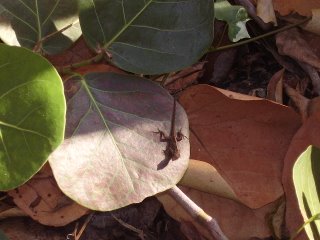 Brown Anole and Sea Grape, Sanibel
Brown Anole and Sea Grape, SanibelI'm in one of my hate-Florida moods, which is becoming a daily occurrence for me. What I intensely love of Florida is the native landscape: scrub pine, palmetto, sea grape, cabbage palm, muhly grass, saw grass, Virginia creeper, live oak, mahagony. Of course, these are the "colorless" plants that tropical landscapers replace with more "authentic" flora, all to conform to some Ohioan's idea of what Florida should be. It's the way that a chanteuse singing in English with a French accent is somehow more authentically French than if she sang in French.
Okay, I probably hate Ohio more than I do Florida.
My hate-Florida mood is also deepened by a variety of calamities (that's too big of a word for it, I know) with my home institution: for instance, an incredibly short-sighted and typical proposal to develop a satellite campus as a part of a large real-estate deal that would further cause development in panther habitat. This actually repeats the original sin of my home institution's founding ten years ago, which is described in a news story by Michael Grunwald of The Washington Post:
Of course, the above is old news as far as my university is concerned, and it's only gotten worse since this article four years ago. The only good news with the university's new proposal is that it met with a uniform protest against it by the Republican state legislators of Charlotte County, where the new satellite campus is supposed to be built.The classic case was the proposal to build Florida Gulf Coast University on rural land donated by Ben Hill Griffin III, the scion of a prominent Florida agribusiness and real estate family, and the brother of Florida Secretary of State Katherine Harris.
Eller didn't think Griffin's 760-acre land gift was so altruistic, since Griffin's firm owned 11,000 acres nearby. Eller predicted in a memo that the new university would stimulate "unprecedented" development up to seven miles east, demolishing prime panther habitat. In September 1994, Eller and other biologists drafted a "jeopardy opinion," a formal conclusion that the project would violate the Endangered Species Act.
Then the power politics began.
First Sen. Bob Graham (D-Fla.) forwarded the wildlife service a letter from former water district chairman James Garner, a well-wired lawyer-lobbyist representing Griffin. After meeting with Garner in Atlanta, Fish and Wildlife officials quickly backed down. The revised opinion still said the project "raises serious concerns regarding the future status of the Florida panther," but its jeopardy finding was switched to a no-jeopardy finding.
Then the pressure shifted to the Corps. Then-Sen. Connie Mack (R-Fla.) wrote Col. Terry Rice, then the agency's Florida commander,urging him to approve the permit. Chiles, a Democrat, also wrote Rice to "emphasize the importance of FGCU as a state priority."
"My God, the curses I heard from members of Congress over that university," recalled Rice, who now works on environmental issues for the Miccosukee Indian tribe. "It was just brutal."
In the end, Rice issued the permit. The new university -- which specializes in environmental education -- is already surrounded by a sports arena, the region's largest mall, Ben Hill Griffin Parkway and several rambling 18-hole subdivisions. Environmentalists call it Florida Golf Course University, and signs on campus warn against feeding the alligators. During a recent driving tour, Audubon Society biologist Michael Bauer described it as "an ecological disaster." A moment later, an errant tee shot nearly hit his windshield.
The university was supposed to be southwest Florida's turning point. In exchange for the permit, Rice demanded that a regional growth commission be established to devise a plan to protect panthers and the Estero Bay watershed's dwindling wetlands. When Lee County rejected the plan, Rice angrily ordered a sweeping environmental study of the Corps program here. "We were approving projects all over the place; we had no idea what we were doing," he says.
Today, the study still languishes in the Corps bureaucracy.
For me, personally, I am becoming far too weary of all of this continued chipping away of the wetlands, pinelands, panther habitat, etc., all under the guise of educational development. Of course, it's about greed.
I again wonder why do I continue to endure here. Is it because of the unspeakable ache I feel when I watch a wood stork walk across a fairway to the golf course pond to feed? Or that brown anole among the sea grape on Sanibel?
Comments